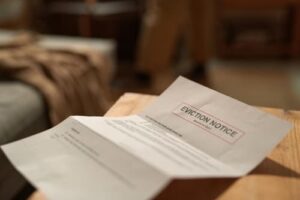Being Evicted in Florida: What You Need To Know!
If you rent an apartment in Florida, you know that you have certain obligations and duties to your landlord. One of the most obvious, is to pay rent on time. There are others, such as agreeing not to allow illegal activities to take place on the property and not staying beyond your lease period. In each of these circumstances, a landlord has a right to end a tenancy and if you do not leave, they have the right to evict. When you’re being evicted, understanding Florida eviction law can be complex, and this article is meant to clarify the eviction process.
If you are a landlord or a tenant and are having issues with an eviction, the St. Petersburg landlord lawyers at the Lopez Law Group are here to assist.
What Is the First Step in An Eviction?

What Happens After a Landlord Files for Eviction in Florida?
If you fail to vacate the premises within the notice period, your landlord will file for eviction. Once the landlord goes down and fills out the paperwork, the court will issue a summons usually within 2-3 days that the lawsuit is filed. After the summons has been issues, you as the tenant will be served with official documents letting you know that a lawsuit has been filed against you for an eviction. This paperwork will usually be served by a process server or by a sheriff and they will typically serve you at your home or place of employment. Once you have been served with an eviction lawsuit, you as the tenant will have 5 days to file your answer or response with the court. If you as the tenant reply and it is uncontested, the eviction usually will happen relatively quickly. But if the tenant contests the eviction, the process could take much longer.
If the eviction is contested and the eviction is based on nonpayment of rent, the court usually will require that the tenant deposit the rental payments into the court registry. If it is a contested eviction, often times a judge will order both parties to attend a mediation to try and settle the dispute.
Once a judge makes a decision and if they rule in favor of the landlord, the judge will enter what is called a final judgment for eviction. After this is done, the clerk will issue a writ of possession. This writ gives the tenants 24 hours to collect all of their belongings and exit the property. Once that 24-hour time period expires, the sheriff will accompany the landlord to the property and return possession of the property back over to the landlord. At that point, to ensure the tenants do not come back, the landlord is allowed to replace or change the locks.
What Should You Do if You Are a Landlord or Tenant and Dealing with An Eviction Issue?

St. Petersburg Landlord and Tenant Attorney, Sean Lopez
We know that an eviction can be a trying time not only for tenants, but also for landlords. If you feel as though your landlord is wrongfully evicting you or if you are a landlord and you feel you need help evicting a tenant, we can assist. Our tenant lawyers in St. Petersburg can be reached at 727-933-0015. We are standing by ready and waiting to speak with you to see if we would be able to assist.
